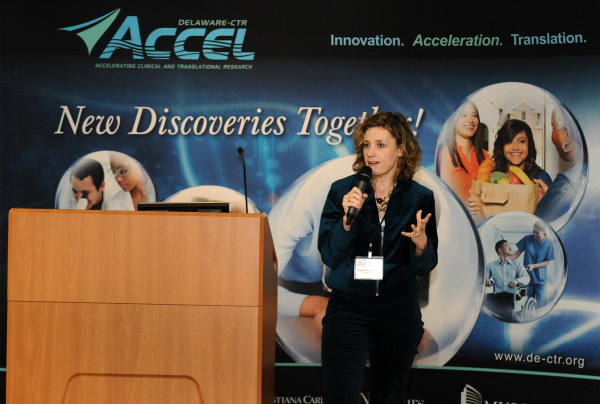ACE Research Awards program helps advance community-based research

As Christiana Care Health System advances community-based research, investigators presented study proposals that pair community members with academic-based researchers at the inaugural ACE Research Awards in December at Wilmington Hospital.
The ACE research awards program, also known as ACCEL Community-Engaged Research, is a small-grants program with a supportive, required curriculum for teams taking their early steps in community-based research.
Community engagement and the ACE awards are key components of Delaware CTR-ACCEL, a multi-institutional program to accelerate clinical and translational research and build research infrastructure at four partner institutions — Christiana Care, the University of Delaware, Nemours/A.I. duPont Hospital for Children and the Medical University of South Carolina.
At the research awards event, attendees learned from experts about the promise and potential of community-based research.
Speaker J. Sanford Schwartz, M.D., Leon Hess Professor in Internal Medicine at the University of Pennsylvania and a consultant in Christiana Care’s Value Institute, said that in considering the elements of community-based research, he could think of no better place than Delaware for such studies. Christiana Care, he said, is a “world-class medical center,” with collaborative relationships with “world-class partners,” such as the University of Delaware and Nemours. Carolyn Jenkins, DrPH, APRN, BC-ADM, RD, FAAN, the Ann Darlington Edwards Endowed Chair of the Medical University of South Carolina, identified community-engaged research as “a powerful tool that has been underused in the academic arena. The challenge is for academicians to learn how to share leadership with local communities.”
Jenkins shared her experience in tackling diabetes across two South Carolina counties where more than 12,000 African-Americans had been identified with the disease. Working with neighborhoods and 16 agencies, Jenkins and her team built a coalition of scientists and stakeholders to take community-driven education to people in settings where they lived, worked and played. As a result, Jenkins said, there was progress in eliminating disparities in diabetes testing, decreasing emergency room visits, and decreasing amputations in the target community.
At the December kick-off event for the ACE Research Awards, two approved proposals and two developing proposals were highlighted in anticipation of starting year-long studies as early as March 15.
One will study the survivors of cancer, their level of physical activity after diagnosis and impediments to sustaining activity. The project is a collaboration among the Helen F. Graham Cancer Center & Research Institute, Cancer Support Community Delaware and the Department of Health & Behavioral Nutrition at the University of Delaware.
A second project will redesign the state’s annual Youth Tobacco Survey to include a neglected population — Delaware youth with disabilities, in sixth through 12th grades. Initiated by advocates for persons with disabilities, the project is a collaboration of Center for Drug and Health Studies and the Center for Disability Studies, both at the University of Delaware, and the Delaware Division of Public Health, with researchers bringing together educators, members of the disability community, public health practitioners and academic researchers.
“We’re about a year into the grant and we’re making enormous progress in community-engaged research … in bringing together stakeholders for meaningful collaboration.”
The proposals are expected to be awarded up to $20,000 each from ACCEL at the completion of the nine-week curriculum, said Heather Bittner Fagan, M.D., MPH, FAAFP, co-director of ACCEL Community Engagement and Outreach. “We guide our research partners through all the steps for community-based participatory protocols so they are ready to begin their work at the end of the curriculum,” she said.
ACCEL is working with other community engagement research concepts as part of the curriculum to develop their potential for future ACE awards, said Michael Rosenthal, M.D., chair of Family & Community Medicine at Christiana Care and ACCEL’s leader for community engagement and outreach.
La Vaida Owens-White, MS, RN, a Community Advisory Committee member and a nurse consultant after retiring from Christiana Care, is developing an obesity-prevention program that would engage civic and religious groups in encouraging school-age young people toward healthier behavior.
Another concept in development would aim to improve the understanding of how community health care workers in Delaware function at their best. Researchers would train a team of community health workers in core research concepts and ask them to lead focus groups to discuss types of interactions patients find helpful. The Christiana Care team would include: Brian Rahmer, Ph.D., MS, research program director for Community Engagement and Health Services in the Department of Family & Community Medicine and a Value Institute scholar; Nora Katurakes, MSN, RN, OCN, manager of Community Health Outreach and Education at the Graham Cancer Center; and Elizabeth O’Neill, BA, project director for the Community Center of Excellence in Women’s Health in the Department of Family & Community Medicine.
All of these individuals and projects will be part of the ACE research curriculum.
“We’re about a year into the grant, and we’re making enormous progress in community-engaged research, modeling our approach on what has been accomplished in South Carolina in bringing together stakeholders for meaningful collaboration,” Dr. Rosenthal said.